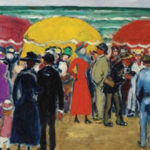We run our website the way we wished the whole internet worked: we provide high quality original content with no ads. We are funded solely by your direct support. Please consider supporting this project.
What is the significance of 2 Kings 13:3–5?
The Lord judged the Israelites by allowing them to be oppressed by King Hazael of Aram (vs. 3). “But Jehoahaz entreated the Lord, and the Lord heeded him; for he saw the oppression of Israel, how the king of Aram oppressed them. Therefore the Lord gave Israel a savior, so that they escaped from the hand of the Arameans.”
In the light of Jehoahaz’s prayer and the severity of Hazael’s oppressive treatment of Israel, God reversed his judgment. This verse, like many others, shows how God graciously alters his plans as a result of prayer and in the light of changing circumstances (cf. Jonah 4:2; Joel 2:13–14). Such flexibility makes sense only if the future is partly open and not exhaustively settled in God’s mind.
Category: Q&A
Tags: Open Theism, Q&A
Topics: Open Theism
Verse: 2 Kings 13
Related Reading

Why Can’t God Stop Evil? The Thomas J. Oord Interview (podcast)
Greg and Thomas talk about Open Theism and how Greg’s views differ from Thomas’s. Theology nerds, get your compass and your flashlight and prepare to go DEEEEEP in the weeds! Thomas’s book: God Can’t Episode 487 http://traffic.libsyn.com/askgregboyd/Episode_0487.mp3

How do you respond to Ezekiel 26:1–21?
There are a number of specific prophecies against various cities in the Old Testament which were fulfilled (though some were not, see Jer. 18:6–10). The Lord’s prophecy against Tyre is one of the most impressive. The Lord says Nebuchadnezzar will ravage the seaport (vs. 7–11) and tear down all the buildings and throw the rubble…

Neo-Molinism and the Infinite Intelligence of God
Classical Molinism holds that, since God is omniscient and knows all truths, he knows not only what every agent will do in the future, but also what every agent would have done in every other “possible world.” In this essay I argue that classical Molinism overlooked a whole category of truths that an omniscient God…

How do you respond to Ephesians 1:4-5?
Question: Ephesians 1 refers to believers as predestined before the foundation of the world. How do you reconcile this with your view that free actions of people (like choosing to believe in Christ) can’t be predestined or even foreknown ahead of time? Answer: It took three hundred years before anyone in Church history interpreted the…

Podcast: Can God Be Surprised?
Greg talks heaven and hell in this solid little episode. http://traffic.libsyn.com/askgregboyd/Episode_0394.mp3

Does the Bible forbid interracial marriages?
Absolutely not! Racist Christians used to argue against interracial marriage by quoting Old Testament passages that prohibited Jews from marrying non-Jews. This prohibition had nothing to do with race, however. In fact, there was no concept of different “races” until white Europeans invented it during the Colonial period, partly to justify their enslavement of other…
